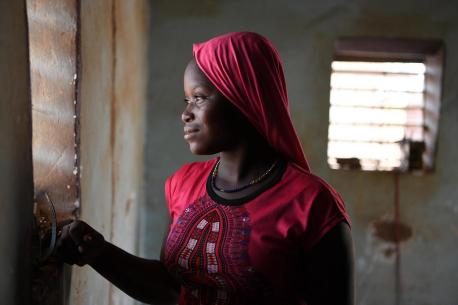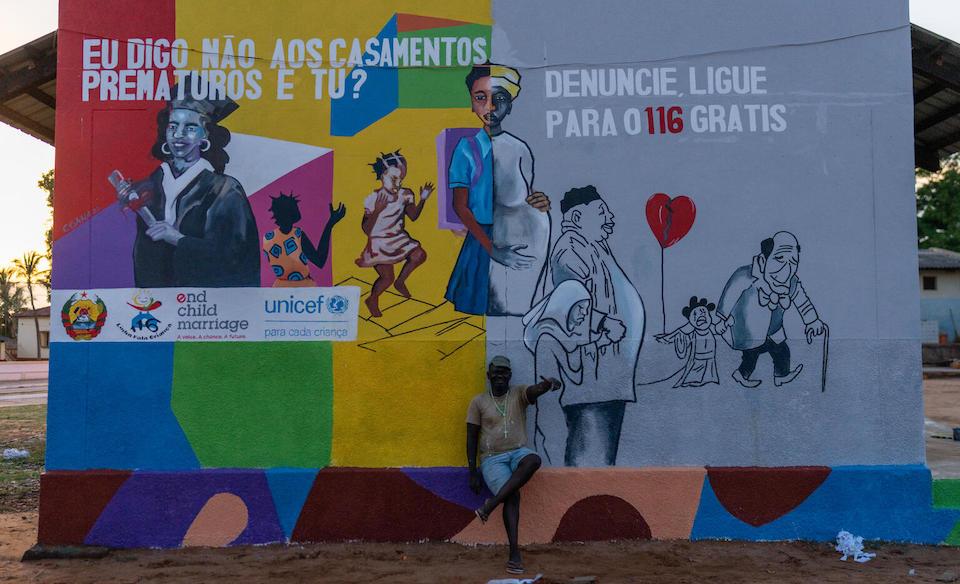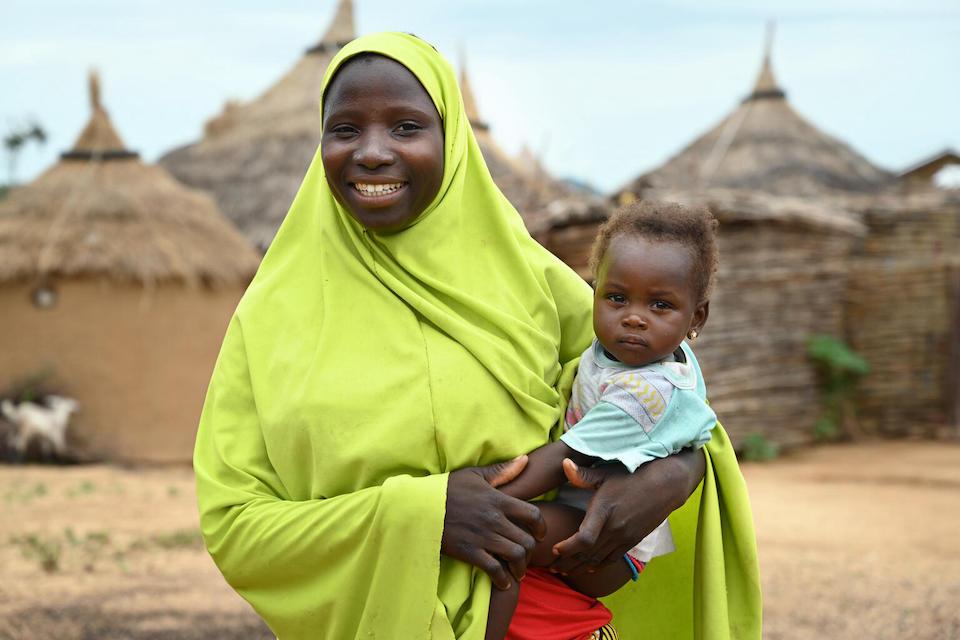
Ending Child Marriage
A closer look at global efforts by UNICEF and partners to end child marriage — and to support those forced to marry before their 18th birthday.
What is child marriage?
Child marriage, also known as early marriage, is any formal marriage or informal union between a child under age 18 and an adult or another child. Girls are disproportionately affected, with 1 in 5 young women aged 20 to 24 years old married before their 18th birthday, compared to 1 in 30 young men.
That 1 in 5 rate actually indicates progress toward eliminating the practice; a decade ago, 1 in 4 girls were married as children. UNICEF estimates that in the last 25 years, some 68 million child marriages have been averted.
And yet: in 2022, 12 million girls became child brides. Momentum has slowed, particularly in sub-Saharan Africa, due to a number of factors, from conflict to climate change to COVID-19 — a global polycrisis — prompting advocates and others working on the front lines to call for help in what has become an uphill battle. The battle cry: time to step up interventions that work.
Here's a closer look at why UNICEF is working so hard to end child marriage, the progress so far and critical next steps.
A child rights violation
Marriage before age 18 is internationally recognized as a violation of child rights. Girls who are married as children are more likely to be out of school, suffer domestic violence, contract HIV/AIDS and die due to complications during pregnancy and childbirth. Child marriage also hurts economies and leads to intergenerational cycles of poverty.
Girls who are at greatest risk of marrying early are also often the hardest to reach with protective services and support. They are often poor, live in rural areas or are otherwise marginalized. Often isolated from family, friends and their communities, they are often deprived of opportunities to pursue a livelihood and to thrive. Child marriage also hurts economies and leads to intergenerational cycles of poverty.
Child marriage and gender inequality
In avoiding child marriage, girls are better able to reach their full potential. Ending the practice is considered crucial to achieving gender equality and improving maternal, child and newborn health, and to driving economic development. For all of these reasons and more, the United Nations has called for an end to child marriage by 2030 as part of the Sustainable Development Goals.
Tackling the issue of child marriage requires recognizing the factors — such as poverty and poor access to education and health care — that enable and perpetuate it. The reasons for the practice vary among countries and cultures.
Some families arrange for their young daughters to be married as a way to cope with a desperate situation. Some believe it will help protect their daughters and secure their future. Also upholding the practice are norms and stereotypes around gender roles and marriage age and the socioeconomic risk of pregnancy outside of marriage.
How UNICEF and partners are working to stop child marriage
In 2016, UNICEF joined UNFPA to launch the Global Program to Accelerate Action to End Child Marriage, focusing efforts in 12 countries where the practice is most prevalent: Bangladesh, Burkina Faso, Ethiopia, Ghana, India, Mozambique, Nepal, Niger, Sierra Leone, Uganda, Yemen and Zambia. (Nearly half, or 45 percent, of child brides live in South Asia; 20 percent in sub-Saharan Africa; 15 percent in East Asia and the Pacific and 9 percent in Latin America and the Caribbean.)
Over two dozen additional countries receive technical support through the initiative to help strengthen services and protections for vulnerable girls.

“Choosing when and whom to marry is one of life’s most important decisions," Dr. Babatunde Osotimehin, Executive Director of UNFPA, the United Nations Population Fund, said when the initiative launched. "Child marriage denies millions of girls this choice each year."
The initiative's main approach is to enlist families, communities, governments and young people to help prevent girls from marrying too young — by empowering young girls who are at risk — and to support and empower those who already married as girls.
Program work is rooted in the following four proven strategies:
- increasing girls’ access to education
- educating parents and communities on the dangers of child marriage
- increasing economic support to families
- strengthening and enforcing laws that establish 18 as the minimum age of marriage
By the end of 2022, through these program efforts:
- over 21 million adolescent girls have participated in life skills training and comprehensive sexuality education — critical forms of support for marginalized girls
- close to 59 million community members have engaged in dialogues on child marriage and gender equality — considered key to creating the necessary enabling environment for change
- close to 40,000 facilities or access points are now providing adolescent girl-friendly services
- over 500 new partnerships have been established to tackle poverty
- eight financed national strategies, 169 sub-national action plans and 156 legal instruments have been adopted to end child marriage
- dozens of research projects have produced quality data and evidence around what works to end the practice
Conflict, climate change and other challenges to progress toward ending child marriage
While gains have been made in some parts of the world, in others, progress has been limited or has stalled.
West and Central Africa, the region with the highest prevalence of child marriage, has made little progress over the last 25 years, UNICEF reports. Many countries in the region, particularly those in the Sahel, have experienced ongoing crises that exacerbate vulnerabilities for girls.
"We're seeing that girls are getting married on average two years younger [in the Sahel] than girls outside the region," Karin Heissler, Regional Adviser on Child Protection for West and Central Africa said in an April 30, 2023, interview with CGTN. "And that’s just a proxy of the deep and dire deprivations of children's rights, and girls' rights in particular."
Households haven't been able to recover from economic effects of pandemic lockdowns. Violent conflicts lead to schools closing and social services weakening. Climate change impacts — droughts, floods, food insecurity — further elevate risks.
"We can't separate food crises from learning crises from child protection crises," Heissler said.
Another region with lagging progress is Latin America and the Caribbean. In this part of the world, large gaps across socioeconomic groups illustrate that the practice is entrenched among the poor.

“The world is engulfed by crises on top of crises that are crushing the hopes and dreams of vulnerable children, especially girls who should be students, not brides,” UNICEF Executive Director Catherine Russell said.
“Health and economic crises, escalating armed conflicts and the ravaging effects of climate change are forcing families to seek a false sense of refuge in child marriage. We need to do everything in our power to ensure that their rights to an education and empowered lives are secured.”
We need to do everything in our power to ensure that [girls'] rights to an education and empowered lives are secured.
Progress is possible, but requires unwavering support for vulnerable girls
At the current rate of progress, it will take another 300 years to end child marriage everywhere in the world, according to UNICEF's global analysis.
Yet even in regions where progress has lagged, UNICEF points to promising examples of improvement. UNICEF-supported social protection programs providing cash assistance are reaching families in need and showing a positive impact. Families who receive support are more likely to keep girls in school and less likely to turn to negative coping mechanisms like child marriage and child labor.
"We’ve proven that progress to end child marriage is possible," Russell says. "It requires unwavering support for vulnerable girls and families.”
An estimated 640 million girls and women alive today were married in childhood. Learn more about the latest trends and future prospects of efforts to end child marriage worldwide. Read UNICEF's May 2023 report, "Is an End to Child Marriage Within Reach?"
Learn more about what UNICEF does and where UNICEF works. Help UNICEF reach more vulnerable children with the support and protection they need to thrive. Donate today.





